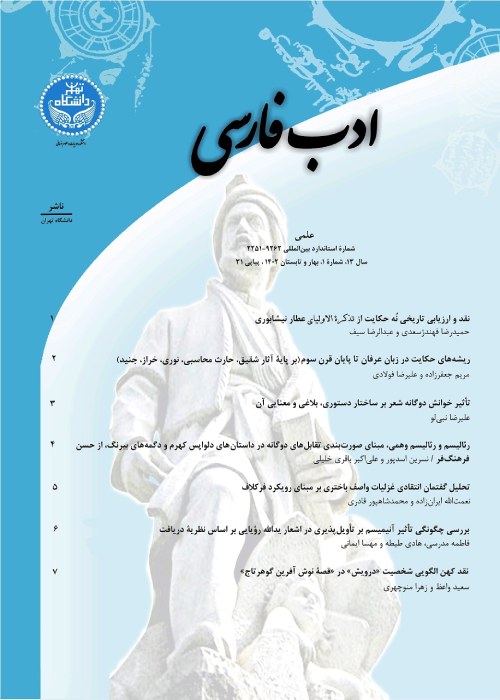Translation and Frequency Measurement of Persian Morphemes in the First Ten Stanzas of the Terki̇b-bend of Bağdatlı Ruhî
Author(s):
Article Type:
Research/Original Article (دارای رتبه معتبر)
Abstract:
The interactions between languages are very common. The languages that are connected with political power, social dynamics and cultural ability have wider effects on their neighboring languages. Iranian languages have enjoyed such a position for many centuries, both before and after the arrival of Islam in Iran. The existence of numerous elements of Sogdian, Pahlavi and Persian languages in different languages shows this. The Persian language, as one of the most important and influential languages of the Islamic world, has had a wide impact on other languages of this vast geography throughout its long history. Indeed, after Iranians accepted Islam, the Persian language found a privileged position among the languages of Islamic culture and civilization and became a medium for transferring religious topics and words to other non-Arab Muslim societies. In such a way that even many Arabic words found their way to other languages, not directly but through the Persian language. The role of Iranians in the bureaucracy system of Islamic societies and the formation of a rich literature were other factors that made other Muslims pay attention to this language. The Ottoman Turkish is one of the languages that has received the most linguistic, intellectual and literary influences from Iranian culture and Persian language. Turkic languages are a group of languages that have been influenced by the Persian language to different degrees and have also had some effects on it. When Divan literature, which was based on Islamic culture and Persian language and literature, was formed, the frequency of Arabic and Persian words in the Ottoman Turkish language increased highly. For example, the frequencies of such words in the poetries of Nef’i and Baki have been estimated at 60% and 65% respectively. This increase in Divan poetry reached such a point that sometimes only verbs were expressed in Turkish. With the beginning of the era of reforms and the increase of western and archaistic ideas in Anatolia, especially after the establishment of the Republic of Turkey, the rejection of eastern values intensified and extensive measures were taken to purify Turkish language in this country. In this way, many Arabic and Persian words were discarded and Turkish equivalents were found or created for them. Despite this, nowadays, many Arabic and Persian words, combinations, grammatical elements and expressions can still be observed in Turkish language; although their frequency has undoubtedly decreased compared to Ottoman Turkish. In this research, in addition to translating the first ten stanzas of the famous Terki̇b-bend of Bağdatlı Ruhî into Persian, we use the statistical analysis and frequency measurement method to calculate the influence of the Persian language on this sample of Ottoman Turkish lyrical poetry at the morpheme level. The findings of this research show that more than one fifth of the morphemes in this text are borrowed from Persian. There are also important intellectual common aspects between Persian literature and the aforementioned poetry.
Keywords:
Language:
Persian
Published:
Persian Literature, Volume:13 Issue: 1, 2023
Pages:
69 to 88
magiran.com/p2713035
دانلود و مطالعه متن این مقاله با یکی از روشهای زیر امکان پذیر است:
اشتراک شخصی
با عضویت و پرداخت آنلاین حق اشتراک یکساله به مبلغ 1,390,000ريال میتوانید 70 عنوان مطلب دانلود کنید!
اشتراک سازمانی
به کتابخانه دانشگاه یا محل کار خود پیشنهاد کنید تا اشتراک سازمانی این پایگاه را برای دسترسی نامحدود همه کاربران به متن مطالب تهیه نمایند!
توجه!
- حق عضویت دریافتی صرف حمایت از نشریات عضو و نگهداری، تکمیل و توسعه مگیران میشود.
- پرداخت حق اشتراک و دانلود مقالات اجازه بازنشر آن در سایر رسانههای چاپی و دیجیتال را به کاربر نمیدهد.
In order to view content subscription is required
Personal subscription
Subscribe magiran.com for 70 € euros via PayPal and download 70 articles during a year.
Organization subscription
Please contact us to subscribe your university or library for unlimited access!


